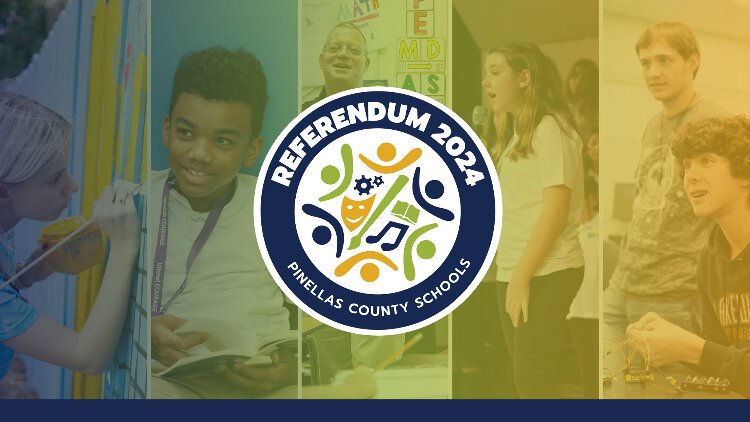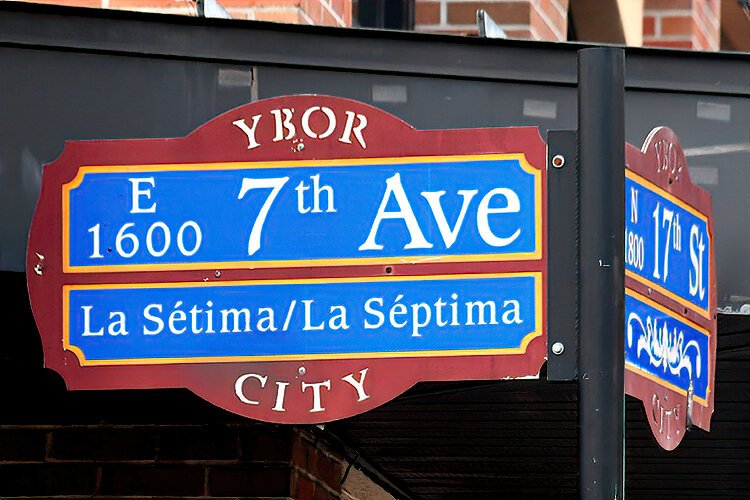Partner Partner Content Pinellas County Schools Referendum funds reading programs that build student confidence
The reading, art, music and technology programs funded by the Pinellas County Schools Referendum include instructional tools that help reading intervention specialists build skills and confidence in struggling high school students.
This story is part of an underwriting agreement Pinellas Education Foundation and 83 Degrees Media have in place to spotlight programs that work toward equitable education achievement, economic prosperity and future success for all students in Pinellas County Schools.
Northeast High’s Patricia Jones and Seminole High’s Theresa Almonte help students at risk of slipping through the cracks build the skills and confidence to pass a critical test and make it through high school.
As reading intervention specialists, they work with students who’ve scored Level 1 or 2 on the FAST Reading assessment, below the Level 3 required to graduate.
“We teach the students who are struggling the most,” Jones says. “They come into our classes so we can give them additional support on the test.”
Since reading ability affects every academic subject, the whole school day can be a difficult struggle for these students.
“These are the students working sometimes twice as hard as others to reach where their peers are and be able to say, ‘I made it,’” Almonte says. “It’s like running a marathon where they’re not meeting that time they are supposed to be at. They’re working more intensively than the average student. Having some type of support, some type of widespread net, that’s catching them and bringing them up to that level is neat to see. Students realize ‘I can do this.’ But it does take extra work.”
Schools Referendum funds tools for teaching
At the middle and high school levels, the reading, technology, art and music programs funded by the Pinellas County Schools Referendum include instructional software Jones, Almonte and other intervention specialists use to target instruction to individual students’ needs.
There are programs like Lexia, which covers grammar, word study and comprehension. Students take an auto-placement to determine what they know and what they need to learn.
“It’s a more personalized and adaptive instruction for each student so they’re able to work at their own pace while I’m able to walk around and facilitate learning for the students,” Almonte says. “This is in addition to their regular reading instruction. It
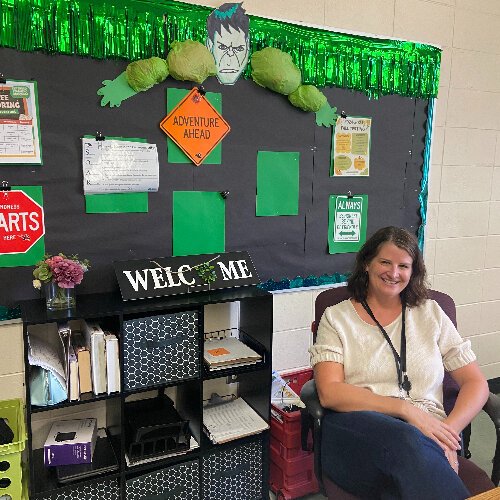
Seminole High’s Theresa Almonte
allows students to have more individualized instruction. It pinpoints right where they are, what types of learning they may have missed growing up, may not have been fully able to take in at the time it was being taught, and places them right where they need to be.”
The software program Albert.io is another valuable tool that helps identify students’ needs and guide instruction. Teachers use it to pull student data and check student progress in specific areas like morphology, or how words are formed from smaller building blocks. That area is a significant piece of the FAST assessment.
“With Albert.io, we’re able to sit down and give students individualized assignments,” Jones says. “They’re able to work at their own pace and you’re able to see how they’re progressing and take that data and formulate the independent lesson plans for them. They’re able to see the progression of learning with Lexia and Albert.io.”
Almonte says the the programs complement, guide and individualize instruction.
“These aren’t stand-alone programs,” she says. “Yes, they are individualized and they’re working at their own pace. But what they’re doing allows us to use this information and pull these students together and work with them in small groups on the areas where they need extra support and strength.
The referendum funds professional training and development for reading intervention specialists, including on the software platforms that help target instruction, and initiatives to engage students. Jones says a program Level Up for Literacy provides a stipend to schools. A team at the school level then decides how to use the funds on initiatives that engage and motivate students.
“Sometimes we know that students need an extra nudge to get them engaged and excited,” Jones says.
Seeing results
Jones says the referendum helps teachers make a difference. She has seen students go from a a level 1 and a score of 174 on the FAST to a 3 over the course of a school year. Those students now build confidence and skills to carry them through high school to graduation, she says.
“It’s amazing because many of them have not been able to pass state assessments so they’ve been in intensive reading year after year after year,” she says. “When you see students who have failed consistently achieve success, that’s one of the great ways we can see these programs are working.”
Almonte says the impact goes beyond reading scores.
“Some of these students feel like they’re failing at everything they’re doing in school,” she says. “You can see it. Not only in their reading class, you see it in their other grades, you can see it in their face. You can take a little more time with them not only in academics but the support you give them every day. These are the kids that matter. These are the kids that are at risk of dropping out. These are the kids that don’t make it to graduation day. We can be there to say ‘Yes you can.’ I think that’s an important part of our job to let them know it’s possible. Don’t count yourself out, you can do this.”
Without the referendum’s funding, Jones says many of these students would continue to struggle.
“I think many of my students would fall through the cracks,” she says. “It is very
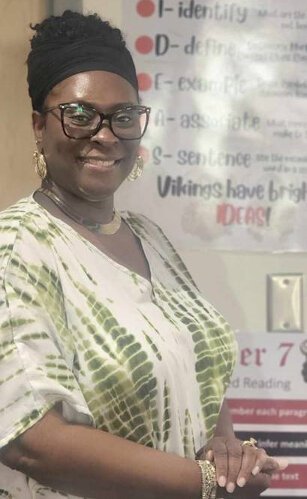
Northeast High School’s Patricia Jones
difficult to be a high school student and you are asked to read something and you can’t. Simply because you don’t have the skill set to do so. That would also increase the dropout rate because no child wants to sit in a classroom and think they’re less than or lacking those skills. Because we have a group of students who similarly need same the level of support it’s a safe space.”
Maintaining an A-district
The November referendum renewal puts 15 percent of funding toward reading, technology, art and music programs. The proposed increase in the property tax from ½ a mill to a mill, means the total funding for those programs would increase from the current $12.5 million to $18.7 million in 2025-26 school year.
With the current referendum in place, Pinellas County’s third-grade English Language Arts (ELA) achievement on FAST is 63 percent for 2024, above the state average of approximately 57 percent. That places Pinellas County Schools in the top 15 school districts in the state for third- grade ELA achievement.
“This year is a good example of the power of investing in literacy programs,” says Pinellas Education Foundation CEO Kim Jowell.
In the 2023-24 school year, Pinellas County Schools also achieved an “A” grade from the state for the first time in the district’s history. Jowell says renewing the referendum renewed “is critically important for us to continue this type of success.”
One key piece of the referendum renewal increases the annual salary stipend for teachers from $6,328 to $11,081.
“Teachers are the foundation for student learning and success,” Jowell says. “Having high-quality teachers and retaining teachers is critical for student success. The extra financial resources we have through this referendum helps us retain talent.”
This year’s referendum also introduces a $2,910 salary stipend for support staff.
“That is really important,” Jowell says. “if we don’t have bus drivers getting kids to school they’re not in school learning.”
Overall, she says the referendum is crucial for Pinellas County Schools to maintain and build on its successes.
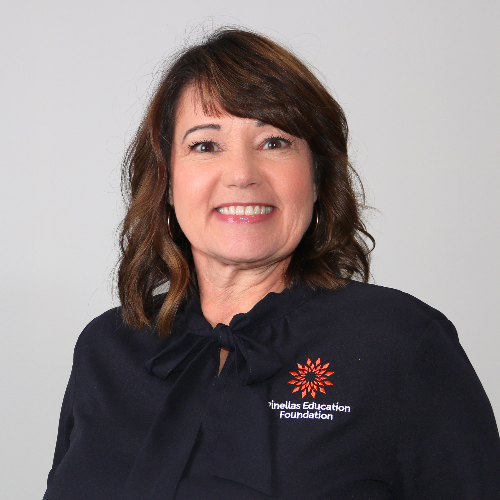
Pinellas Education Foundation CEO Kim Jowell
“The last time this referendum was on the ballot in 2020 it passed with 79 percent, which is incredible,” Jowell says. “I’m so thankful and grateful that we have a community that invests and believes in the power of education. I hope that continues this November because just because we’ve gotten here doesn’t mean we don’t still have the need.”
For more information, go to Pinellas County Schools Referendum and Pinellas Education Foundation: Support the Referendum

